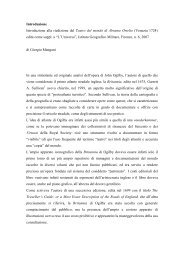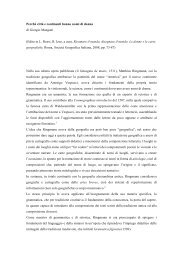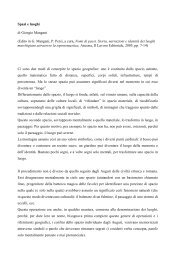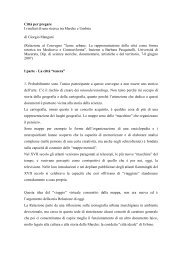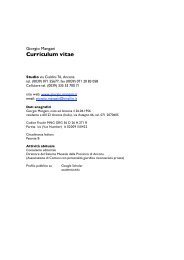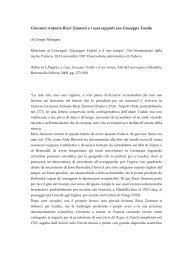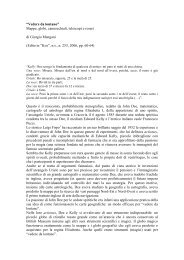Ortelius's Typus Orbis Terrarum (1570)
Ortelius's Typus Orbis Terrarum (1570)
Ortelius's Typus Orbis Terrarum (1570)
Create successful ePaper yourself
Turn your PDF publications into a flip-book with our unique Google optimized e-Paper software.
manifestation of the divine benevolence; this attitude reflects, somehow, Ortelius’ motto<br />
contemno et orno (I despise the world, but, at the same time, I honour it with my historical and<br />
geographical work, which celebrates nature).<br />
Altough it was a Familist fundamental, this conviction was also shared by other forms of<br />
individual and moderate religiousness, such as the one of Mercatore, who, as a matter of fact,<br />
theorize it.<br />
The figure of Atlas who held the globe represented on the title page of Atlas was in fact an<br />
emblematic figure of this religious conviction, which Ortelius and Mercator had in common,<br />
about which the geographer from Rupelmunde had treated in his commentary on the Epistle<br />
to Romans. Mercator’s Atlas was, actually, a governor of Mauritania, who became a god,<br />
thanks to his work; so he was a man who won immortality by his earthly work, as Familists<br />
asserted as regards the value of good actions carried out during one’s life.<br />
At the times of the first elaboration of Ortelius’map, in a letter to Joannes Vivianus dated<br />
1573, Mercator described his cosmological model which was based on the thesis of the dual<br />
human and divine nature of man; the model was called "<strong>Typus</strong> universitatis", and the word<br />
"typus" is re-used by Ortelius for his map, thus bringing out the importance of the idea of<br />
model in comparison with the idea of representation, better esemplified by the word Imago.<br />
The cosmological model of Mercator was based on the mystic idea of letter Y (pict. 2-3),<br />
which represented the narrow road to salvation and the large one to perdition. Once more<br />
free will was the distance point between Mercator and Ortelius’ religious ideas and the<br />
Protestant ones widespread in the XVIth century Low Countries, the latters asserting the<br />
thesis of predestination.. According to Mercator, <strong>Typus</strong> universitatis, that is to say the deep,<br />
ethical and cosmological structure of the world, was an enormous Y, whose long and narrow<br />
side connected earth with empyrean, whereas the shorter and large side took to nothingness.<br />
So, Y represented a sort of crossroads where man and his earthly life have to face the<br />
problem of choice, according to their free will, between good and evil, beetwen sin and<br />
salvation.<br />
Perhaps now we can better understand the Ciceronian quotation that Ortelius introduces on<br />
his map which inaugurates the Theatrum orbis terrarum: the <strong>Typus</strong> orbis terrarum:<br />
Quid ei potest videri magnum in rebus humanis, cui aternitas<br />
Omnis, totiusque mundi nota sit magnitudo.<br />
It is a key concept which enables us to understand the meaning of the map that, according to<br />
Ortelius’ attitude, acts as a symbol (all his maps are symbols) for the following reasons:<br />
a) its placing at the beginning of the atlas;<br />
b) the interactive relation between the Ciceronian passage and the decoration of the map,<br />
that is to say the light-blue background on which earthly globe is set, filled with clouds;<br />
c) the clear peculiarity of "cosmographical meditation" – as Mercator called it – that comes out<br />
from a general reading of the map, according to Ortelius’ culture and sensbility, as I tried to<br />
point out in some of my previous works.<br />
First of all the image of earth is placed in a cloudy universe, presented to the spectator as a<br />
"world seen from the outside"; it is something like the idea of the stoical theatrum mundi,<br />
where gods looked at men’s life as if they were spectators of a theatre comedy or tragedy.<br />
On the map, however, we can also find a Ciceronian quotation that transfers man’s condition



